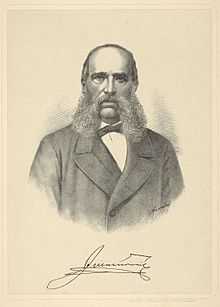Ivan Mažuranić
| Ivan Mažuranić | |
|---|---|
 | |
| Portrait of Ivan Mažuranić | |
| Ban of Croatia-Slavonia | |
| In office 20 September 1873 – 21 February 1880 | |
| Preceded by | Antun Vakanović |
| Succeeded by | Ladislav Pejačević |
| Personal details | |
| Born | 11 August 1814 Novi Vinodolski, Kingdom of Croatia, Austrian Empire |
| Died | 4 August 1890 (aged 75) Zagreb, Kingdom of Croatia-Slavonia, Austria-Hungary |
| Nationality | Croatian |
| Political party | People's Party Independent People's Party |
| Occupation | Poet, Politician |
| Known for | The Death of Smail-aga Čengić (poem) |
Ivan Mažuranić (pronounced [ǐv̞an maʒǔranitɕ]; 11 August 1814 – 4 August 1890) was a Croatian poet, linguist and politician—probably the most important figure in Croatia's cultural life in the mid-19th century. Mažuranić served as Ban of Croatia-Slavonia between 1873 and 1880.
His realistic assessment of strengths and weaknesses of Croatia's position between the hammer of Austrian bureaucracy and the anvil of Hungarian expansionist nationalism served his country invaluably in times of political turmoil. Mažuranić is best remembered for the "triple accomplishment"—contributions in economics, linguistics, and poetry.
Biography
Mažuranić was born into a well-to-do yeoman family in Novi Vinodolski in northern coastal Croatia. He became a man of many abilities: he spoke 9 languages and was well versed in astronomy and mathematics.
Politics and economy
Mažuranić was the first Croatian ban not to hail from old nobility, as he was born a commoner.[1] He was a member of the People's Party.
He accomplished the Croatian transition from a semifeudal legal and economic system to a modern civil society similar to those emerging in other countries in central Europe.
Mažuranić has modernized Croatia's educational system by forming a public school network and reducing the importance of denominational schools;[1] a process seen by some later Serbian ideologues as an intentional blow to the integrity of Serbdom in Croatian lands.[2] Others consider this to have been a necessary step in modernization and secularization of Croatian society.
Linguistics

His linguistic work is remarkable for its enormous influence. Mažuranić's "German-Illyrian/Croatian Dictionary", 1842 (coauthored with Josip Užarević) is at the very heart of modern Croatian civilization, since in this 40,000-entry dictionary the principal author Mažuranić had coined words that have become commonplace in standard Croatian—for instance, Croatian words for bank accountancy, rhinoceros, sculptor, ice-cream, market economy, high treason or metropolis. He was much more than "language-recorder"; "language-shaper" would be a better description.
Poetry
But, in his native land, Mažuranić is above all the beloved poet of Smrt Smail age Čengića—"The Death of Smail-aga Čengić", 1845. This epic poem is full of memorable verses that have become embedded in the national memory of his people, who cherished it as the treasure of a "Homeric" wisdom praising such epic virtues as fortitude, fidelity and justice.
The tale is based on an assault in Montenegro, when a petty local Muslim tyrant was killed, as an act of vendetta, in an ambush set by Montenegrins. Mažuranić's poetry transformed a rather prosaic act of tribal revenge into a hymn celebrating the struggle for freedom—acted out under the hostile forces of fatality.
|
Ljutit aga mrko gleda Gdje se silom divit mora Silan arslan gorskom mišu. |
The angry aga glumly glances As he, the mighty lion, is forced To admire the mountain mouse. |
Following in the steps of Croatian poets like Kačić and Ivan Gundulić (his chief national influence, whose main epic Osman Mažuranić completed), Mažuranić closed the era of Romanticism and of classic epic poetry in Croatian literature.
Legacy
- Mažuranić's portrait is depicted on the obverse of the Croatian 100 kuna banknote, issued in 1993 and 2002.[3]
- Ivan Mažuranić Square in Zagreb is named in his honor.
References
- ↑ 1.0 1.1 "Mažuranić, Ivan". Proleksis Encyclopedia. Retrieved 2011-01-20.
- ↑ "Ivan Mažuranić: liberalne reforme Hrvatskog sabora 1873.-1880. i srpska elita u Hrvatskoj" (PDF) (in Croatian). Retrieved 15 May 2012.
- ↑ Croatian National Bank. Features of Kuna Banknotes: 100 kuna (1993 issue) & 100 kuna (2002 issue). – Retrieved on 30 March 2009.
External links
| Wikimedia Commons has media related to Ivan Mažuranić. |
| Political offices | ||
|---|---|---|
| Preceded by Antun Vakanović |
Ban of the Kingdom of Croatia-Slavonia 1873–1880 |
Succeeded by Ladislav Pejačević |
| Cultural offices | ||
| Preceded by Ambroz Vranyczany |
President of Matica hrvatska 1858–1872 |
Succeeded by Matija Mesić |
| ||||||||||||||
|